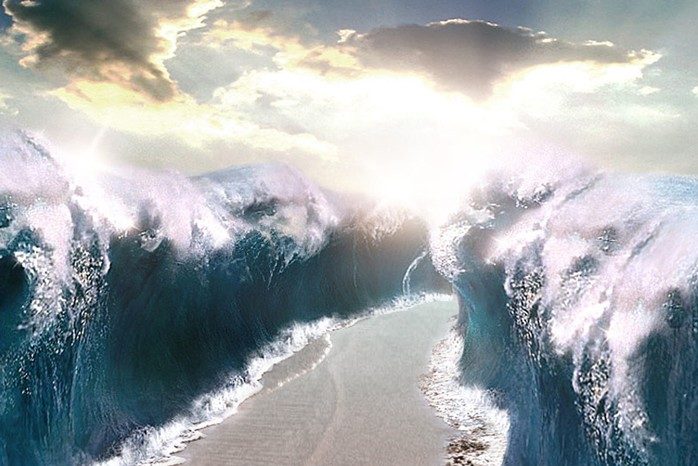The following drosha was given at the Saranac Synagogue in Buffalo on the eighth day of Pesach 5747 (1987), before Yizkor, and transcribed from memory by Jeffery Zucker. Comments and questions are very welcome.
In Hallel, we read a description of how the Red Sea parted: “The Sea saw and fled” (Ps. 114). The Gemara asks the obvious question: “What did the Sea see to make it flee?” and comes up with the un-obvious answer: “It saw the bones of Joseph!” (which the Jews brought with them on leaving Egypt).
This is something I have often read, without considering it.
Recently I began to think about this: what was there about the bones of Joseph which should make the Sea flee? And I believe I have come up with an answer.
The greatness of Joseph’s life is that he acted against his nature. I’ll give a few examples of this. First, he resisted the temptation provided by Potiphar’s wife, which entails going against one’s natural impulse. Then, when his brothers visited him in Egypt, he forgave them for their past action against him, and even gave them land for settling in Goshen.
How many of us would behave this way to anyone who tried to kill us?
Finally, according to the Midrash, during the seventeen years that Joseph’s father Jacob was with him in Egypt, Joseph avoided ever being alone with him! The reason was simply to prevent the situation that Jacob should ask Joseph how it was that he, Joseph, after being reported killed by wild beasts many years earlier, should end up as Viceroy of Egypt! For if Jacob asked him about that, Joseph would have to reveal his brothers’ bad behavior to his father.
What an example of noble behavior against one’s nature!
The Brisk Yeshiva observes a number of yahrzeits. Here is the story of one of them. Many years ago, R’ Yosef Baer Soloveitchik, the student of R’ Chaim Volozhin, the student of the Gra, was the Rav of Slutsk. (This was before his students moved to Brisk, under his son, R’ Chaim Brisker.)
One day he gave a psak din (judgment) against a shochet, in a case involving kashrus. The next day, the shochet entered the study house, where R’ Yosef Baer was learning with his students, brandishing his knife, clearly in a distraught state, and accused R’ Yosef Baer of giving a dishonest judgment. (Of course, this accusation was groundless.)
Eventually, after pouring out his distress, he left. R’ Yosef Baer then ran after him, shouting: “I forgive you! I forgive you!”
A few days later, he heard that the shochet had been killed by a bull which he had bought. (The Gemara says that one who shames a talmid chochem in public will die prematurely.) R’ Yosef Baer blamed himself bitterly for the shochet’s fate. “What do you mean?” his son asked, “I was present, and I saw you run after him and forgive him!” “Yes,” he replied, “I told him I forgave him, but I did not mean it in my heart!” So he blamed himself for NOT acting against his nature!
R’ Yosef Baer went to the funeral of the shochet, and acted as a chief mourner, tearing his clothes. Also, because the shochet had no sons, he said kaddish for him for eleven months. And the yahrzeit for that shochet is observed in the Brisk Yeshiva to this day.
The Rambam gives the method whereby we can test someone who claims to be a prophet. Suppose such a person declares that he will perform some miracle, for example, change the direction of the current of some stream, and then proceeds to do so. We may still not infer that he is a prophet! All that means, says the Rambam, is that he is a tzaddik, who has managed to act against his own nature, and can therefore make the stream (or whatever) act against its nature!
Now we can see what it was that made the Sea flee when it saw the bones of Joseph.
It thought: “Here is someone who could successfully act against his own nature, therefore I can do the same!” And the Sea, acting against its nature, parted.
One more question: Why did the Sea have to derive inspiration from Joseph, a dead person?
One might suppose there were a number of living people present, who might similarly have inspired the Sea, for example Moses, or Aaron, or Nachshon ben Aminadav (whom we encountered, submerged to his nostrils, in our last drosha).
I think the answer is this: Living people, however great, tend to arouse jealousy, or feelings of insecurity or competitiveness. A dead person arouses no such feelings, and we can appreciate such a person’s greatness more objectively.
This is a good thought to keep with us when those of us with departed forebears come to say Yizkor today. We can derive inspiration from our forebears, without their having been great rabbis. I have heard stories of grandparents of some people present today, who were simple Jews, but would be considered tzaddikim if they were alive today. It is my wish that the memory of our departed forebears may inspire us to act for the better, against our natures.
Pesach Kasher V’Sameach!!
